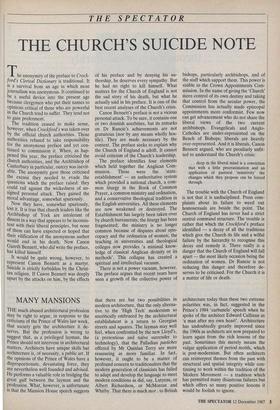MANY MANSIONS
THE much abused architectural profession may be right to argue, in response to the criticisms of the Prince of Wales last week, that society gets the architecture it de- serves. But the profession is wrong to suggest that, as a privileged layman, the Prince should not intervene in architectural matters. Architects have unique skills but architecture is, of necessity; a public art. If the opinions of the Prince of Wales have a disproportionate, devastating force, they are nevertheless well founded and advised. He performs a valuable role in bridging the great gulf between the layman and the profession. What, however, is unfortunate is that the Mansion House speech suggests that there are but two possibilities in modern architecture, that the only alterna- tive to the 'High Tech' modernism so uncritically embraced by the architectural establishment is a return to Georgian streets and squares. The layman may well feel, when confronted by the new Lloyd's, (a pretentious and naive surrender to technology), that the Palladian pastiches offered by Mr Quinlan Terry are more reassuring as more familiar. In fact, however, it ought to be a matter of profound concern to traditionalists that the modern generation of classicists has failed to adapt and develop the language to meet modern conditions as did, say, Lutyens, or Albert Richardson, or McMorran and Whitby. That there is much mor .; to British architecture today than these two extreme polarities was, in fact, suggested in the Prince's 1984 'carbuncle' speech when he spoke of the architect Edward Cullinan as `a man after my own heart'. Architecture has undoubtedly greatly improved since the 1960s as architects are now prepared to learn again from the rich lessons of the past. Sometimes this merely means the vulgar application of period motifs, which is post-modernism. But often architects can reinterpret themes from the past with structural and spatial integrity, while con- tinuing to work within the tradition of the Modern Movement — a tradition which has permitted many disastrous failures but which offers so many positive lessons it would be foolish to ignore.


























































 Previous page
Previous page